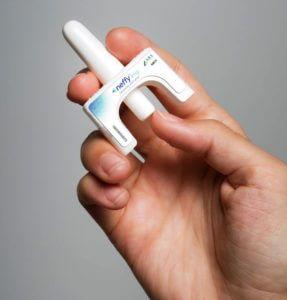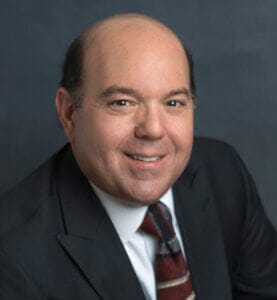In the fall of 2023, ARS Pharma’s epinephrine nasal spray seemed like a sure bet to win Food and Drug Administration approval.
In May 2023, an FDA advisory committee had recommended approval of the spray, called neffy, as the first alternative to epinephrine auto-injectors for treating anaphylaxis. Then over the summer, the company and FDA officials came to agreement on final labeling, says Richard Lowenthal, ARS Pharma President and CEO.
According to Lowenthal, a senior FDA official had clearly stated that she would not discuss such labeling unless approval was close. He took that, along with the fact that the FDA typically follows the recommendation of its advisory committee, as clear signals that neffy would soon get the green light.
However, the FDA stunned the company and many in the food allergy community on September 19, 2023 by turning down neffy’s approval. Instead, the regulator asked for further research. Specifically, FDA requests a study of two doses of epinephrine given via nasal spray in people with nasal congestion from allergic rhinitis. This needs to be compared against similar patients receiving two epinephrine doses given by syringe.
“They blindsided us,” Lowenthal says. Repeat doses in rhinitis patients with nasal congestion “was not an issue” to advisory committee experts.
ARS Pharma is working quickly to enroll participants in the new clinical trial. But even so, it’s going to take about six months to have results ready to submit to the FDA. The agency then has up to six months to review and give its decision.
FDA’s Unexpected Requirement
So why the approval delay? Lowenthal doesn’t know all the details. But he says the FDA’s director of the Division of Pulmonary, Allergy and Critical Care, Dr. Sally Seymour, had been “adamant that she was not going to work on labeling [for neffy] unless approval” was imminent. ARS and the FDA worked through those details. “We had final labeling. We had agreed on labeling,” says the CEO.
Plus, the company had agreed to an FDA request for a repeat-dosing study of neffy in rhinitis patients with congestion. But it was to be done after approval.
The stunning news that the FDA now required that study before weighing approval of the nasal spray came in an FDA Complete Response Letter. It was signed by one of Seymour’s colleagues in the allergy division.
Some allergists who have looked closely at neffy’s already-submitted data express confidence in the spray without the additional trial.
Food Allergy Community Impact
Dr. Jay Lieberman, an allergist-immunologist at University of Tennessee Health Science Center, said studies show neffy should work comparably to auto-injectors during allergic reactions.

This is based on research comparing changes in blood pressure and heart rate after dosing the nasal spray, EpiPen or epinephrine via syringe. Clinical trials also found peak concentration of epinephrine in the blood, and the time to reach peak concentration, after dosing with the various epinephrine products once or twice all fell within a similar range.
“I have two kids with food allergies and I’m all for extra safety and efficacy, as much as we can get,” says Lieberman. “I understand the FDA’s job is different than mine as a clinician,” says the allergist, who is an adviser to ARS Pharma as well as Aquestive, which is developing an under-the-tongue epinephrine film. “That being said, I don’t think that specific study is needed to prescribe this medication.”
Plus, Lieberman notes that delaying approval has real-world implications. People with severe allergies frequently fail to carry or to use epinephrine auto-injectors. Studies show allergy patients and caregivers often hesitate to use auto-injectors because of needle fears. He thinks a nasal spray could help with both.
“Almost every patient would rather treat themselves with a non-injectable form,” says Lieberman, who chairs the American College of Allergy, Asthma, and Immunology’s Food Allergy Committee.
Epinephrine Spray in Stuffy Noses
During the advisory committee meeting on May 11, the question of how well neffy works in people with nasal congestion came up.
The company had done a clinical trial on one dose of neffy in people with stuffy noses related to rhinitis and compared that to people receiving epinephrine with a syringe or auto-injector. That study found nasal congestion actually sped up absorption of epinephrine via the nose. However, in those with runny noses, between 10 and 20 minutes after a dose, blood levels of epinephrine also dropped off faster.
With that, some members of the FDA panel were asking, “is the effect going to wear off?” Lowenthal explains.
Most of the 22 committee members, many of whom are allergists, didn’t seem concerned. After hours of discussion, they voted. The decision was 16 to 6 to recommend that the FDA approve the nasal spray for adults, and 17 to 5 to recommend it for children weighing 66 pounds or more.
“I do think that this needle-free delivery system not only fills a great unmet need, but … would reduce time to dosing,” said Dr. Janet Lee, chief of the division of pulmonary and critical care medicine at Washington University School of Medicine in St. Louis.
In voting to recommend approval for children, Dr. Paul Greenberger said the nasal spray should reduce “delays, hesitancy, and outright refusal in the use of epinephrine auto-injectors.” Greenberger is with the division of allergy and immunology at Northwestern University’s Feinberg School of Medicine in Chicago.
Committee members who voted against neffy approval had wanted to see a randomized clinical trial conducted in people actually experiencing anaphylaxis. But experts say this is unlikely to happen for neffy – or for any epinephrine product. That would be considered too risky to undertake.
‘Thought We Were Done’
Two weeks after the May 2023 advisory committee meeting, ARS Pharma staff met with the FDA. This is where they agreed to do a post-approval study on two doses of neffy in people with nasal congestion. The company also agreed to set up a multi-center registry to collect data from allergists on how well neffy performs during allergic reactions.
“We thought we were done,” Lowenthal says. Once the labeling was agreed upon, the company began hiring and ramping up production in anticipation.

But a week before the expected approval on Sept. 19, 2023, ARS Pharma got notification from the FDA that there were “deficiencies” in the neffy application. The company contacted Dr. Janet Woodcock, the FDA’s principal deputy commissioner, and the ombudsman, Virginia Behr. They were told they would have to wait to get the details.
When Lowenthal ultimately learned the reason for the denial was the repeat-dose nasal congestion study, he was dumbstruck. (The FDA declined to comment on the review process, saying commercial information from drug makers is confidential.)
Lowenthal has been involved in 20 new drug approvals. This is the first time he’s been with a company that was kept in the dark until the last minute.
The level of scrutiny for the epinephrine sprayer is unexpected, he adds. According to FDA documents, no clinical trials were required for the original auto-injector, EpiPen, before it was approved in 1987. “If you look in the literature, no one has studied twice-dosing with EpiPen before us,” he says.
Other lifesaving nasal sprays, including naloxone (Narcan), were not asked to study the effects of nasal congestion to gain FDA approval, says Lowenthal. (He was also involved with bringing that product to market.)
All the more perplexing is that studies show nasal congestion during anaphylaxis isn’t a common symptom. Studies have found only 2 to 5 percent of people report nasal congestion as a symptom of anaphylaxis.
New Neffy Trial Enrolling
Lieberman notes that the “vast majority” of anaphylactic reactions get better with one dose of epinephrine. The allergist says the most important factor in whether the drug will halt anaphylaxis is using it early enough during a reaction.
ARS Pharma has started enrolling 46 healthy volunteers for the new clinical trial. The trial is a repeat-dose study, which will compare epinephrine given via manual syringe and neffy.
Participants will receive two doses of neffy or epinephrine from a syringe, when they have clear nasal passages and again when they have rhinitis. Nasal congestion will be provoked by squirting an allergen up their nose. The trial will also include a comparison of whether it’s better to repeat doses in the same nostril or in different nostrils.
In August 2023, the FDA also issued new guidelines for eliminating nitrosamine in medications. Nitrosamines can be found in water, foods, and some drugs, and long-term exposure is linked to cancer. To comply, ARS Pharma has to re-test for the impurities. Lowenthal says current testing shows neffy’s levels are far below any FDA cutoffs.
Fallout from Denying Neffy
By leading the company to believe approval was imminent, the FDA rejection has stung, Lowenthal says.
“The trigger was the labeling. FDA told us over and over – ‘we are not doing labeling until we are sure we are going to approve this product’. When they said, ‘do the labeling,’ we said, ‘go’. We told the commercial team and manufacturing team to start getting ready. We spent millions and millions that we would have not spent had they told us earlier.”
The company laid off 140 people hired in anticipation of the approval. They also did an early production run of the medication.
If approval takes the full year and stretches into fall 2024, the costs to the company will be enormous, he says. “We’re going to get the study done, and get them the data they want,” Lowenthal says.
Lowenthal hopes the FDA regulators feel some urgency. “People are upset about it,” he says of the delay. “People want an alternative form of epinephrine.”
Related Reading:
Setback for Neffy Epi Spray: FDA Calls for More Study
Epinephrine Auto-Injector Alternatives in the Pipeline
All About Epinephrine: Allergic Living’s Guide





